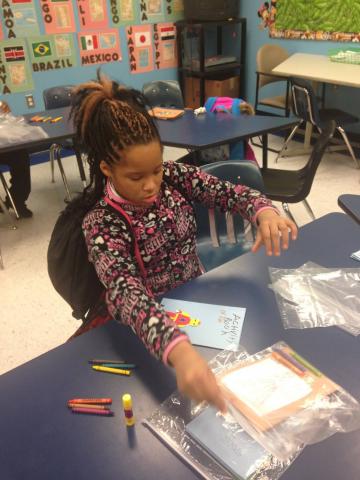Teachers in Residence
Teacher in Residence
Each year, Learning to Give works with a Summer Teacher in Residence! For ten weeks in the summer, one Detroit-area teacher helps develop resources, make connections with Wayne County educators and nonprofits and guide the direction of philanthropic education. They share their passion for empowering all students through volunteering and community awareness by creating resources and connecting with teachers in the community.
Resources by Detroit-Area Teachers in Residence
The Teacher in Residence (TIR) applies their area of professional interest toward helping other Wayne County classrooms connect to their community. This page contains some of their work.1. Philanthropy and Service-Learning Lesson Plans
This History of US Philanthropy Timeline features stories of diverse individuals and organizations who have used their time, voice, connections and resources to make an impact on the world. Young people, who are capable changemakers, can examine this history to question and explore the ways philanthropy has created lasting change and changed itself. By sharing stories of the past, we equip and empower youth to shape the story of philanthropy today and in the future. Youth voice and action are part of this story.
This Inclusive Communities toolkit inspires youth to notice and speak up about accessibility and inclusion. Ensuring that all people feel included, supported, and seen is the work of building a community. Youth of all abilities may serve as culturally competent peers and ambassadors for their peers who are marginalized or misunderstood. The resources and lessons included here are great for adult- or youth-led groups.
These SEL activities provide culturally responsive and culturally affirming activities to build Social Emotional Learning (SEL) while encouraging youth to foster their personal and collective voice and role in diverse communities. Our activities challenge youth to discuss identity and social issues, respect others, and take generous action toward a socially just community.
Building a Caring and Inclusive Classroom: This unit of three lessons, written by an expert in trauma-informed practice, includes lessons on self-regulation, difficult conversations, and welcoming others with respect. Maureen Klein also wrote the TeachOne lesson for fall of 2019 called Words Bring Peace. This single-session lesson is a great start to community building, and includes a service-learning project of making "calming kits" to help kids handle stress.
Refugee Lessons: This unit of four lessons, written by a Detroit teacher, uses stories and video to illustrate the life of refugees. We compare refugees in World War II to refugees today. The suggested service-learning includes creating a welcome kit for refugee children. If you have refugee children in your classroom or community, this is a must-teach! This toolkit provides more ideas and community resources.
Constitution Day: Each fall classrooms across the country teach about the Constitution on Constitution Day. This unit includes one-session Constitution Day lesson plans for K-2, 3-5, 6-8, and 9-12. The Constitution is a living document, carefully constructed over 200 years ago, lays out the rules and rights to establish a community of people who get along, are fair to one another, and have the right to live out their best selves. In each lesson of this unit, students learn about the goals, the components, and the lasting legacy of the Constitution, as it relates to making the country, and world, a better place.
 2. Service-Learning and Community Building Activities
2. Service-Learning and Community Building Activities
The four classroom activities facilitate interaction with the community and guide students to investigate community needs and resources and their own personal interests. The activities provided also help students take action to address a need and then reflect on the service-learning process.
3. Service-Learning Toolkit
This toolkit guides planning from a Learning to Give lesson to connecting to a community resource. It follows the format of What? So What? and Now What? as teachers dive into science, service, and social studies. Students are involved in real community issues, writing for a purpose, critical thinking, and problem solving.
Teachers in Residence from Previous Years:
- (2015) Caitlin and Scott Opfermann at Detroit Edison Public School Academy - focus on tools for bringing learning into the community
- (2016) Angelia Mahone at Durfee Elementary - focus on science and the process of service-learning
- (2017) Carole Hawke at Robichaud High School - focus on refugees and community nonprofits
- (2018) Anthony Salciccioli at Clarenceville High School - focus on social studies and the Constitution
- (2019) Maureen Klein at Bennie Elementary in Allen Park Public Schools - focus on trauma-informed teaching practices and STEM/SEL connections
- (2021) Tori Anderson at Detroit Public Schools Community District - focus on Culturally Responsive SEL for Social Justice
- (2022) Erica Saville, social worker in Allen Park Public Schools - focus on cultural competency and youth awareness of accessibility and inclusion.
- (2023) Scott Wozniak, social studies teacher in Hamtramck Public Schools - focus on diverse expressions of philanthropy in history.
About the Campbell Urban Philanthropy Education Resource
David Campbell, a life-long Detroit resident, believed that all children could learn philanthropy as part of their school experience. The featured resources and lessons of the Campbell Urban Philanthropy Education Resource build an understanding of philanthropy as giving time, talent, and treasure for the common good and students’ belief that they have something valuable to contribute. Thank you to the McGregor Fund for making this resource and Teacher in Residence opportunity possible.
